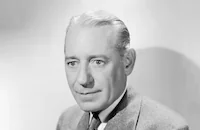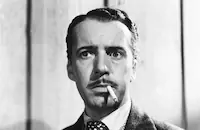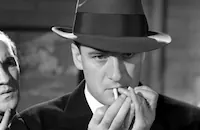City in Terror

Brief Synopsis
Cast & Crew
Crane Wilbur
Jane Bryan
Henry O'neill
John Russell
Elizabeth Risdon
Jimmy Mccallion
Film Details
Technical Specs

Synopsis
The Carter family enjoys a peaceful dinner when the sound of an explosion from next door shatters their quiet. Rushing to the window, the family witnesses a police lieutenant making a hasty exit from their neighbor's bombed-out garage. The neighbor, a leader of the reform party, lies dead on the floor of the garage, and the Carters' testimony becomes District Attorney Stephen Palmer's only hope in convicting the suspected killer, gangster Nick Bartel. Before reaching the witness stand, however, the family finds itself the target of Bartel's brutal attacks and intimidating threats. After father Matthew is beaten and little Ted is kidnapped by the gangsters, grandpa Ulysses Porterfield, a veteran of the Spanish Civil War, decides he will tolerate no more intimidation. Although Palmer belabors his case in court, Bartel's acquittal appears inevitable because of the lack of evidence. While searching for his grandson, the grandfather is himself taken hostage by the thugs, but manages to escape. Grandpa then locates the building in which Ted is being held hostage and effects a rescue. Grandfather and grandson then rush to the courthouse, arriving just in time to take the witness stand. After attesting to Bartel's treachery, the Carters also implicate the mayor's office in the crimes.

Director

Crane Wilbur
Cast

Jane Bryan

Henry O'neill
John Russell

Elizabeth Risdon

Jimmy Mccallion

Dickie Jones
Fred Tozere

John Gallaudet

Grace Stafford

Don Douglas
William H. Royle

Boyd Irwin

Emmett Vogan
George Guhl
Norman Willis
Alan Davis
Charles Richman
Millard Vincent
Kenneth Harlan

Elliott Sullivan
Walter Fenner
Edgar Edwards
Nat Carr
Reid Kilpatrick
Arthur Gardner
Tommy Bupp
Jerry Tucker
Philo Mccullough
Galan Galt
Frank Meredith
George Volk
William Gould
Al Herman
Pat O'malley
Hal Craig
Eddy Chandler
John Harron
Ed Parker
Frank Mayo
William Thorne
Tom Chatterton
Crew
Bryan Foy
Gordon Hollingshead
Lucien Hubbard
Lee Huginin
Howard Jackson
Stanley Jones
Lee Katz
Harold Mclernon
Charles Novi
Arthur Ripley
Russ Saunders
Howard Shoup
Arthur L. Todd
Jack L. Warner

Film Details
Technical Specs

Quotes
Trivia
This was one of the few movies which received an 'approved' certificate despite two violations of the production code: the evil-doers did not receive their just desserts by the end, and police officials should always be champions of good. Frank Shaw, a former mayor of Los Angeles, filed a $1,000,000 lawsuit against Warner Bros., claiming the corrupt mayor in the movie was modelled after him, and that it showed he was responsible for the bombing of a private investigator. Shaw had been forced out of office in October 1938 by a political reform group. Warner Bros. countered that the movie was a remake of a 1931 film, but East coast advertising utilized the suit with "The Ex-Mayor's Libel Suit Picture".
Edgar Edwards (Lineman), Arthur Gardner (Marge's Boyfriend) and John Harron (Second Policeman) are actors listed with their character names in studio records, but they did not appear in the movie.
Notes
This film, which was copyrighted under the title The Man Who Dared, was Crane Wilbur's first feature for Warner Bros. and was a remake of their 1931 film Star Witness (see below). Star Witness was also a working title for this film, as were It Did Happen, Hero for a Day and I Am Not Afraid. The film was reviewed under the latter two titles. According to a Hollywood Reporter pre-release news item, Frank Heath was replaced by Russ Saunders as assistant director soon after filming began. A New York Times article notes the film was one of a number of films that were in violation of a Hays Production Code provision that required that all wrong-doers depicted in a film must suffer retribution by the film's end, and that law enforcement officials must always be champions of good. Although they are punished in the end, the mayor and the police department in the film are shown as being responsible for much of the city's crime.
October and November 1939 Hollywood Reporter news items note that Frank Shaw, a former mayor of Los Angeles who was forced out of office in October 1938 by a political reform group, filed a $1,000,000 lawsuit against Warner Bros., claiming he was used as the prototype for the corrupt mayor character, and that the film intimated that he was behind the bombing of a private investigator named Harry Raymond. Shaw also contended that former Los Angeles police captain Earle Kynette was libelously portrayed in the picture as the corrupt police captain. Kynette was, in fact, convicted of the attempted murder of Raymond in June 1938. Warner Bros. responded to the charges by stating that the film was a remake of a film made many years before. The studio reportedly capitalized on the publicity generated by the lawsuit and advertised the film on the East Coast as "The Ex-Mayor's Libel Suit Picture." Information on the outcome of the suit has not been located.












